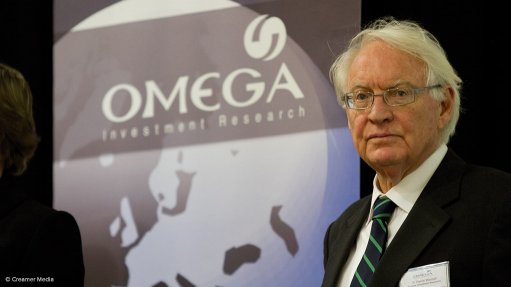
Dr Denis Worrall
Given that I was a founding member and co-leader of the Democratic Party (precursor of the Democratic Alliance), it will not come as a surprise that my sympathies lie with the DA in next week’s election. My hope is that it will retain the Western Cape and that it will win Gauteng, and that it will increase its overall performance because this additional support will come from middle-class black voters.
But these personal considerations aside, as Omega`s extensive client-base will know, our principle activity - aside from risk analysis – is promoting trade and investment into South Africa and sub-Saharan Africa. Our international clients also know that South Africa offers a strong case to investors. Yet, ironically, the single biggest obstacle to attracting foreign investors is the ANC Government and its affiliates. To remind you:
- The proposal that every single business in South Africa register with the municipality it is in – an enormous potential source of red-tape and controls. (This is still on the agenda).
- The long-running opposition from within the cabinet to the Massmart-Walmart merger – a significant and big confidence- building transaction.
- The Government`s rejection of South Korea’s second biggest mobile-phone company’s offer to acquire 20% of Telkom - a deal approved by the Telkom board.
- South-Africa`s unilateral cancellation of its bilateral investment treaties with 13 European countries, notwithstanding the EU`s insistence that South Africa desist from the action - even offering in return to relax significant trade barriers for South Africa`s sugar and wine into European markets.
- In response to the adverse European reaction to the cancellation of the bilateral treaties the ANC introduced a bill called the Promotion and Protection of Investment Bill which claims to provide protection to foreign investments. However, the South African Institute of Race Relations, a responsible and credible organisation, claims that this measure, wich is misleadingly named, on the contrary allows extensive expropriation with zero compensation. For more details please refer to their website: www.sairr.org.za.
- The requirement that foreign security companies already in South Africa or wishing to set up in the country must offer up 51% of their shareholding to local investors.
- No foreign investor or even local company will rush to invest in South Africa`s petroleum and oil industry as a result of the recently passed legislation giving the state and BEE companies an almost indefinite shareholding stake.
- The crippling of the mining sector from an investor point of view as a consequence of conflicting policies, favoritism in the allocation of permits and licenses, bungling, Marikana and strikes.
We all too easily account for this in terms of a lack of vision and incompetence, etc; whereas in reality what is behind this is a determined and concentrated drive for central and executive state control. Bilateral investment treaties? Problematic if you want to nationalise a particular industry. The same applies to a brilliantly positive South Korean investment because Telkom is a target for nationalisation. Municipal registration of every business in its jurisdiction? A brilliant short-cut to gaining control of whole sectors of the economy. Centralising and control are what is behind this. After all, even the integrity and independence of South Africa’s legal profession and judiciary have already been compromised as a result of executive intervention. Even university autonomy has been infringed.
Is it all so gloomy? Yes, with one spark of hope which we will come to in a moment. The election, as commentators tirelessly tell us, will not change who runs the country. But the election itself is a game -changer: voter participation is more diverse than in previous elections; there are more political players offering a greater diversity of choices; the ANC is faction-driven and can’t guarantee the support of unions; and key figures of the stature of Desmond Tutu (he has announced he will not vote for the ANC), Mamphela Ramphele and others like Jay Naidoo, Ronny Kasrils and Nozizwe Mandlala-Routledge (until recently ANC ministers), Archbishop Thabo Makgobo, business leader Reuel Khosa and a whole slew of ANC intellectuals like Prince Mashele and exceptional journalists like Ferial Haffajee, Songezo Zibi, Barney Mthombothi and Mondli Makhanya have clearly broken ranks with the ANC. While their attitudes are public, one has to ask how many persons share their views without making it publicly known?
This election is a game-changer in another way. After 7 May we will definitely be out of the Mandela-Mbeki era and deep into the Zuma era - an era already deeply scarred by ignominy, corruption and shame. As Max du Preez wittily writes in his latest book, "Mbeki will be remembered as the intellectual President who championed the African Renaissance. History will remember Jacob Zuma as the President who fought to stay out of jail".
So what is the spark of hope? All scenarios agree with the consultancy firm Control Risks that the best case risk scenarios for businesses operating in South Africa over the next five years is “more of the same”. This is the view also of two respected South African futurists - Frans Cronje in his book Our Next Ten Years and Jakkie Cilliers of the Institute for Security Studies in South Africa’s Futures 2030. Both in their “best of the scenarios” suggest that shortly after the 2014 elections, a reform movement emerges within the ANC that challenges the dominant consensus on redistribution both within the party and in the court of public opinion. This movement isolates the trade unions, which gives it more space to making new economic policy; and the ANC stops threatening the media, civil society and the judiciary among other positive developments. Likely? Very likely, if President Zuma decides the presidency is a better place than the prospects of prison - or even house arrest in Nkandla.